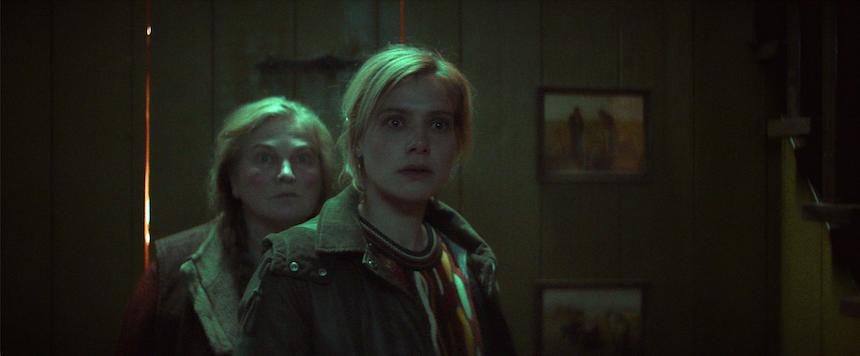Fantasia 2022 Review: MOLOCH, Dark Whispers of Intergenerational Trauma

The camera glides up the stairwell of an old home at the edge of the bog, there are several portraits on the wall of trios of generations of just the women, grouped into trios: Grandmother, mother, daughter. A low rumble knocks one of them down, cracking the glass. This is a succinct visual mission statement for Nico van den Brink’s debut feature; a balanced and dramatic family ghost story, Moloch. It is easy enough to overlook during the sturm und drang of its opening prologue, where a young girl experiences the audible death of her grandmother, perhaps from a seizure or a stroke, while hiding in the closet one floor below.
Flash forward 30 years later, and young Betriek has grown up and has a child of her own. When forced to cut short her successful musical career in the United States after the sudden death of her husband, she returns to her childhood home to raise her daughter, Hannah, with the help of her aging parents. The house is located far outside of the small town, requiring a lengthy drive to drop off and pick up Hannah from school. it results in a simmering conflict between Betriek and her mother, Elske, about their co-parenting styles. Elske does not approve of Betriek’s distracted tardiness, which she perceives as a lack of focus on family. Betriek does not like Elske, now prone to night-seizures herself, going off script, and driving on the back roads near the expansive bogs of peat moss. “Let it be,” is as much of a dialogue about the issue that Betriek gets from her mother.
Normally silent and foggy and dour, there has been some recent excitement in the area, when a team of scientists set-up shop extracting corpses from the bog, preserved across centuries in perfect condition due to the particular nature of ecology. This type of archaeological anthropology has been has been going on across Northern Europe and Ireland for decades. It lends the horror story that follows a strong air of verisimilitude. “Bog bodies” unearthed were often found to be subjected to acts of violence or harsh community justice, hangings or dismemberments, before being dumped in the swamp. When they first started being discovered in the 1950s, the black bodies appeared so fresh, that investigators thought they could be recent crimes. That is a hell of a metaphor, for what takes place in Moloch. The work done by the production design team here almost exact; no enhancement to the strange form of mummification is needed to create lasting, disturbing nightmare imagery.
This violation of the land and its dark history, which has been softened (not all the edges are worn off thought), and is now celebrated by the townspeople with an annual festival to the local bog legend. There are whispers from the swamp itself, though. Restless spirits, begin to drive several members of the dig team mad. To the point where one of them breaks into the Betriek’s home assaults Elske. With the dig in danger, the head scientist enlists the help of Betriek to make peace with the town, and her parents, as well as trying to make some sense of what the heck is going on. Betriek’s father grimly promises to start shooting if trespassing happens again. Discussion over.
A mixture of scientific enquiry and ancient lore is executed in one of the films most sophisticated sequences. As a researcher presents her findings on the local legend of Feike to her boss, it is juxtaposed with the school's play. This visual acting out the genre's typical exposition as dark, whimsical theatre, with the children performing for their parents and community on stage, is intercut with the research team dryly listening to details. The confidence in the filmmaking only increases going forward, as hell really begins to break loose, and the film embraces the shadows and mists of its rich location that were only teased thus far.
The work of foregrounding intergenerational conflict and unspoken traumas, is that by the time the climax of the film comes due there is a sturdy base with the central family, to absorb the startling realization that we have been in the hands of a true magician all along. Like any good spell, it is so effective that we did not even know it was there. Like poor Sergeant Howie, in The Wicker Man, our personal biases and assumptions mask, or simply ignore, many uncomfortable truths in old rural enclaves. That communities can create a culture that grooms, perpetuates, and insulates itself, beyond conventional notions of good or evil, and outside the spheres of science or even religion. Families, be it through secrets or lies, can do this as well. In fact, they do indeed, do this well. Many things get passed down through families: Physical traits, an heirloom, genetic conditions, or physical characteristics. Trauma can be inherited as well.
Moloch explores all of this in a fascinating way that is faithful to the folk horror genre, but elegant in its drama and execution of its ideas. It gets all the spooky stuff right too. The Netherlands have a bonafide gem of a horror movie on their hands, and a filmmaker to keep a very close eye on.
Moloch explores all of this in a fascinating way that is faithful to the folk horror genre, but elegant in its drama and execution of its ideas. It gets all the spooky stuff right too. The Netherlands have a bonafide gem of a horror movie on their hands, and a filmmaker to keep a very close eye on.
Moloch
Director(s)
- Nico van den Brink
Writer(s)
- Daan Bakker
- Nico van den Brink
Cast
- Anneke Blok
- Johan Fretz
- Fred Goessens

Do you feel this content is inappropriate or infringes upon your rights? Click here to report it, or see our DMCA policy.






